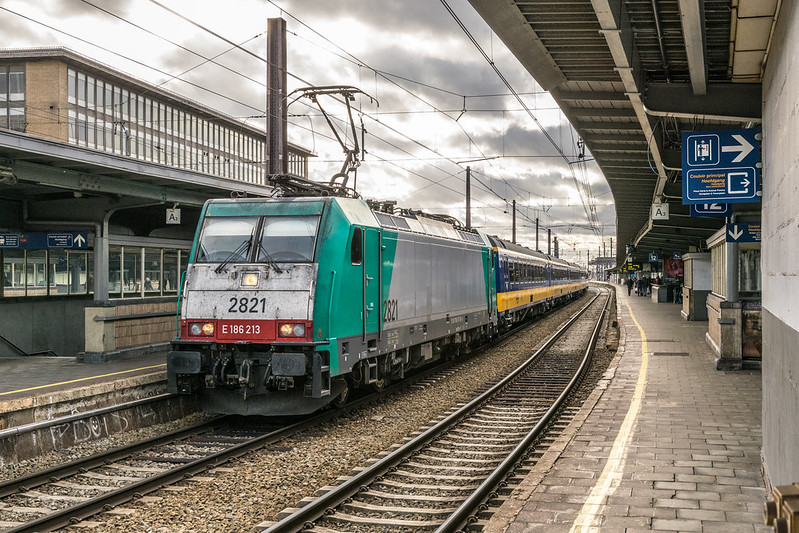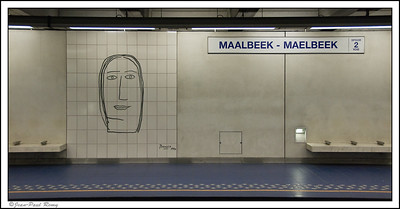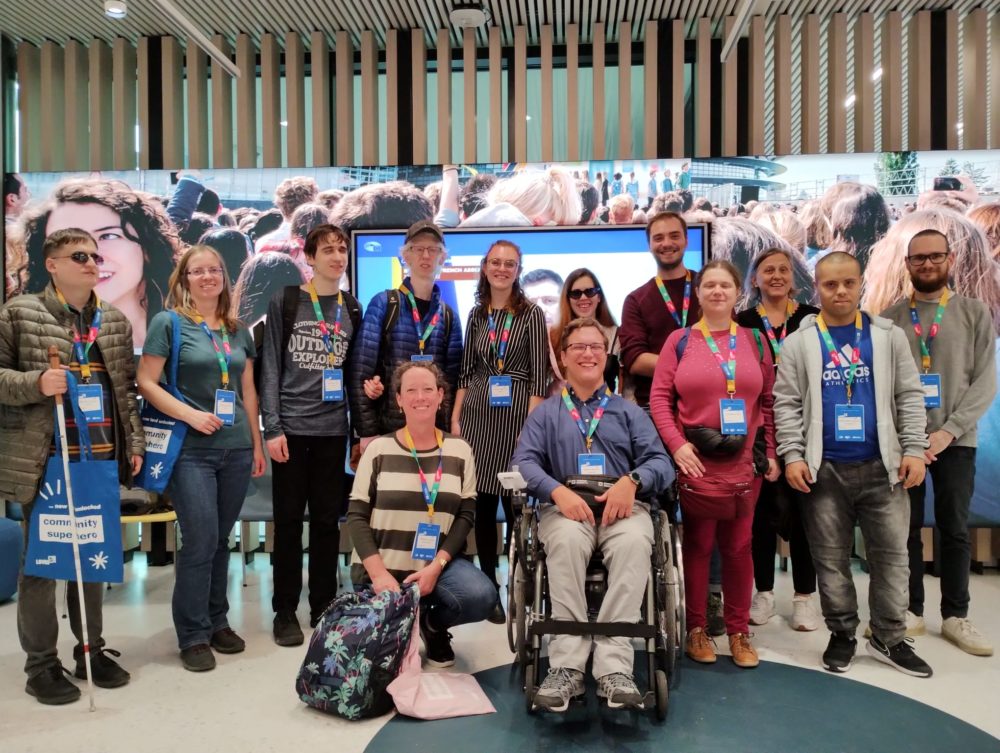I am Balázs Markos. I participated in the LevelUp 2022 event as a member of the European Disability Forum’s group (in the framework of the Ascend project and the Ukraine project). I am a Hungarian citizen, but I have lived in Groningen, in the Netherlands, since 2018. I am a wheelchair user and use a lightweight electric wheelchair. I have travelled to Brussels with my personal assistant.
In this blog, I will focus on sharing my experience with transport.
Blog post written by Balázs Markos – Master’s student of International Human Rights Law and Junior advocacy officer at MEOSZ (Hungarian Association of Disabled Persons’ Organizations)
Wheelchair users in trains
Before moving to the Netherlands, I barely used trains or other forms of public transport. In my home country, Hungary, it is exceedingly difficult for a wheelchair user to do so. Train stations are often inaccessible, and wheelchair assistance must be booked 72 hours in advance. When I moved to the Netherlands, it was a pleasant surprise to me that there, the assistance for wheelchair-user train passengers was working smoothly. Since then, I have become a regular domestic train passenger. However, the trip to Brussels was my first international train journey ever; no wonder I was quite excited and probably even a bit nervous beforehand.
Arranging everything before the departure
To ensure that I receive the necessary assistance, I called the train operator a few days before departure to arrange everything. Upon departure, I received assistance at Groningen station (I needed a ramp to get on board) and successfully embarked on the train to Rotterdam. I had to make a change there as there were no direct trains between Groningen and Brussels.
In Rotterdam, there was some confusion. One attendant at the station told me that I would have to change trains in Antwerp, but then I embarked on the direct Intercity to Brussels, where the staff clarified that there was no need for change. The international leg of the journey was also organised by the Dutch train operator. The assistants in Rotterdam informed their Belgian colleagues on time, and I could manage to disembark in Brussels without difficulties.

The metro in Brussels
Once in Brussels, I decided to take the metro. It seemed convenient; our hotel was just three stops away from the Central train station. In the metro, there were elevators both at Central and Maalbeek stations. On Thursday, both were working properly. A negative experience was that there was a relatively large (10—15cm) gap between the train and the platform in the metro. It was difficult to manage such a large gap with my wheelchair, especially because my assistant had to pull our luggage and lift my wheelchair simultaneously.
Having to use bicycle paths instead of sidewalks
Within Brussels, I did not use public transport. The location of our hotel was very convenient, all the venues were within walking and wheelchair distance. I have observed that the city, especially the historical centre, has many cobblestone streets. It was sometimes difficult and uncomfortable to get around with my wheelchair. We often had to make detours to find accessible pedestrian crossings. Wherever I could, I tried to use bicycle paths instead of sidewalks, but they were scarce and slightly dangerous to use as the bike lanes were not separated from the car lanes (unlike in Groningen).
Broken lift, missed connection, bad communication

My return journey to Groningen on 30 October was quite an adventure. I have booked assistance for my trains in advance, however, due to unforeseen circumstances, I missed my pre-booked train. First, in the morning and early afternoon, I decided to join some fellow participants on a visit to the Parlamentarium, and then we had lunch together in the city centre.
From there, I had to rush back with my assistant to the hotel to pick up our luggage, assuming we could still manage to catch my scheduled train. Just like upon arrival, we took the metro from the hotel to Central station; however, the lift at the metro stop was not working. Since there was only one lift, there was no other way for me to get to the ground than hopping back to the metro, going one stop further, and then walking back 1 km to the station on a hilly street with our heavy luggage. Due to the unexpected turn of events, we missed our scheduled train and had to reschedule assistance at the station. Of course, this meant that we also missed our connection in Rotterdam. In the end, the Belgian staff arranged my assistance from Brussels to Rotterdam, but they somehow forgot to tell their Dutch colleagues that I intended to continue my journey to Groningen. Besides, the Belgian assistant made me sit in the bicycle shed on the train, saying that that was “the right place” for me. (In the Netherlands, I have never had to sit in the bike shed).
Back in the Netherlands
Upon arrival in the Netherlands, a Dutch assistant hopped on the train, calling me by my name and asking me to call their customer service so they could arrange my journey from Rotterdam. I did so, and I was able to contact Dutch customer service by phone within a few minutes. They informed me that I would have to make another change in Utrecht because there were no more direct trains to Groningen so late that day. In both Rotterdam and Utrecht, the transfers went smoothly, the assistants were helpful. I did not have to sit in the bicycle shed. In the end, I arrived safely in Groningen at 1:30 a.m. after all the delays.
I decided to share this story as I thought it might be relevant for wheelchair users who plan to travel abroad by train. The main takeaway? Make sure to arrange everything in advance and be there on time!
Thanks to the EDF for offering me the possibility to participate in this fantastic event.

About Balázs
I am Hungarian and I live in the Netherlands. I am a bachelor’s graduate of International & European Law and a Master’s student of International Human Rights Law. Besides, I am working part-time as a junior advocacy officer at MEOSZ (Hungarian Association of Disabled Persons’ Organizations). Being a wheelchair user allows me to see the world from a different perspective.
Do you have a question for Balázs?
You can contact him by email at markosbalazs@meosz.hu.
About the Ascend project
The Ascend project is funded by Citi Foundation and coordinated by the European Disability Forum. This one-year programme is focussed on strengthening the capacity of the disability movement in Bulgaria, Czechia, Hungary, Romania, and Slovakia.
